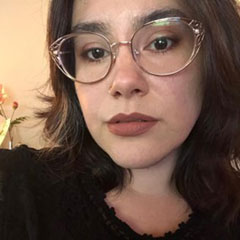Francesca Lewis, Lecturer, Centre for Women’s Studies/English
Francesca recently completed her PhD at the Centre for Women’s Studies and has now been appointed a Lecturer there with the Department of English and Related Literature.

Her work on the lived experience of the borderline sits between medical humanities, mad studies and feminist new materialism.
She is co-founder of the Mad Feeling Collective, a research group comprised of ECRs that draws on lived experience and affect-led methodologies to work on narratives of madness, primarily in TV.
email: francesca.lewis@york.ac.uk
Our 60-second interview with Francesca:
What do you do in the field of mental health?
My work aims to affirm the value and meaningfulness of borderline experience beyond the clinical category of borderline personality disorder. I carve out a space between defining or critiquing BPD as a diagnosis towards exploring how it unfolds and what it might do.
What do you find most rewarding and inspiring in this work?
Contributing to the growing movement of affirming and valuing mad and neurodivergent experience and the vital knowledges it produces. Thinking creatively, “imagining otherwise”.
What is the most challenging or complicated aspect of this work?
Thinking and working through and with my own lived experience and managing the complexities of making myself visible and vulnerable in these ways, while not wanting to become merely a “poster child” for a DSM diagnosis. Not centring the DSM and the clinical sphere, while also not ignoring or underestimating their importance in shaping discourse and experience.
What impact do you hope your work is having- or can potentially have?
I hope to foster more positive regard for those “on the borderline” and to nuance the conversation beyond the acceptance/critique of the DSM diagnostic criteria. To help us think beyond stigmatising discourses about the borderline towards the possibilities of the indeterminate, the ambiguous, and the ambivalent.
Could you share with us one piece of advice that you follow for your own mental health?
Medicalised framings of mental distress are just one of many frameworks for understanding and working with experience. I am allowed to find – or make – alternative meanings that work for me, even if I don’t want to entirely reject the clinical one.